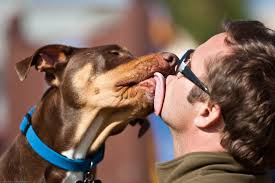 It is quite a common belief that a dog’s saliva is antiseptic and if a dog licks your wound it will heal quicker. Is this an old wives tale? Is dog saliva antiseptic or is dog mouth bacteria harmful and likely to cause infection?
It is quite a common belief that a dog’s saliva is antiseptic and if a dog licks your wound it will heal quicker. Is this an old wives tale? Is dog saliva antiseptic or is dog mouth bacteria harmful and likely to cause infection?
The notion that dog saliva can heal wounds goes way back in history to ancient times. The Egyptians believed in having dogs lick wounds to aid in the healing process and also the ancient Greeks used similar practices. There is even an old French saying which translates to “A dog’s tongue is a doctor’s tongue.”
Do dogs tongues heal wounds
Dog saliva antiseptic
Dogs often lick their own wounds and it does seem to help them heal. Does this mean that dog saliva is antiseptic? The act of licking does help in that it cleans the wound. Licking helps to remove debri and dirt in the wound while the tongue helps to remove it. On top of that the saliva actually contains proteins that promote healing.
Included in these proteins are;
- Histatin: this helps you heal by preventing infections. It also promotes the skin to close over the injured area.
- Lysozyme: this is an antibacterial protein.
- Thiocyanate: as with Lysozyme, it is also an antibacterial protein.
- Nerve Growth Factor (NGF): this grows and maintains nerve cells. It helps heal the wound in half the normal healing time.
In addition, saliva contains Nitrate which is converted into nitric oxide inside the wound. This increases blood flow locally, meaning the body is able to transport more of its own healing factors to the area faster.
This all sounds good with the exception that a dog’s mouth is full of harmful bacteria also.
Dog saliva bacteria
Who really knows where a dog’s tongue has been. It is quite common for them to lick their anus or eat feces and even other dog’s feces.
Humans and dogs have different bacteria in their mouths and most of it won’t go from dogs to humans or the other way around and make them or you sick.
However, there are some diseases that you can get from your dog. This may include salmonella which can cause fever, diarrhea, and vomiting, Giardia and E. coli.
In extremely rare cases, dog saliva has been linked to the death of humans. Capnocytophaga is a relatively common bacteria in dogs. It’s harmless to them, but it can in rare situations be dangerous to humans. People with low immune systems are most at risk, but even then, infection is unlikely. The bacteria enter the skin generally through a bite or when the saliva of the dog comes into contact with an open wound.
In conclusion, do dogs tongues heal wounds or is dog mouth bacteria harmful.
Dog saliva does contain certain protein that can help in the healing process of wounds. However, dogs mouth are not clean and can transmit bacteria and diseases such as Salmonella or Giardia to a person and in rare cases Capnocytophaga. I probably wouldn’t replace the antiseptic cream with your dog’s saliva just to be on the safe side.